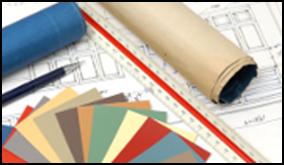Copyright © 2026 American Organization of Building Companies All Rights Reserved
Designing Your Project
Creative & innovative design solutions turn your project into reality
Planning & Budgeting
Proper project planning and budgeting saves time and money
Tips & Tools
Tips & Tools that will help you throughout your project
Renovation Timeline: The Design Phase
Working with a Architectural Design Professional
When working with a design professional, you can expect the design phase on most projects to run six weeks to six months, depending upon your decision making and communications style, and on the size and complexity of the project.
Some very small and simple projects might be designed in as little as two weeks, if they fit well into the designer's schedule. Some very large or complex projects, or projects in which you are really unsure of what you want or in which you may change your mind a lot, may take as long as a year - or more.
When working with a Design-Build Firm and often also an interior designer to design a new construction house being custom-built for you, a year is a very common timeline for the design phase.
Renovation Timetable:
Keeping the Construction Phase Shorter
Decreasing the Renovations’ Length of Time
Here are some ways to decrease the length of time your renovation is actively under construction, through effective preparation:
• Be fully prepared and highly detailed in design plans, specifications and material selections before
beginning construction.
• Have all necessary permit applications filed and permits issued in advance.
• Be aware of potential building code issues. Your project consultant will discuss potential problems in
advance with building inspectors.
• Have financing fully secured before beginning, including an emergency fund of at least 15% of the
budget in case of hidden problems encountered or items would like to add during the process.
• Order items far enough in advance that they will be available on site by the time they are needed for
construction, even if they come in as much as 50% later than promised by vendors.
• Have your temporary housing lined up before construction begins, if applicable, and make sure it is
available for as much as twice the scheduled construction duration in case of emergency. If
temporary housing is not slated to be used, try to line up emergency backup temporary housing in
case of severe unexpected issues during construction, particularly for a big job.
Length of Construction Phase is Vital
If the length of construction phase is really vital to you, you can also design for efficiency of construction. Clearly these options can be limiting, and may not be appropriate for your project.
• Avoid additions, particularly ones that require a foundation. Consider going up rather than out.
• Avoid taking out walls, particularly load-bearing walls.
• Avoid relocating plumbing fixtures, gas fixtures, or high-load electrical appliances.
• Consider finishes for floors that allow for speed of installation, such as sheet linoleum or vinyl, wall to
wall carpet, and floating pre-finished flooring (such as wood, bamboo, or cork).
• Avoid custom cabinetry and other custom made items that require long lead times or long
construction periods, in favor of stock and semi-stock items.
Finally, sometimes - but definitely not always- construction schedules can be speeded up by throwing more money at an unforeseen problem.
• If you're paying for temporary housing and numerous unforeseen problems create delays that
become a hardship, consider asking your construction manager how much more it would cost to get
more workers onsite to speed things up.
Renovation Timetable:
The Construction Phase
Construction Phase Will Vary
The construction phase will vary with the size and complexity of the project, and can be extended by difficulties uncovered during construction, by indecision, or by change orders. Most projects will last from two months to one year.
Here are some general guidelines:
• Kitchen renovation: Two to six months (many are three to four)
• Bathroom renovation: Two weeks to four months
• Partial overall renovation including kitchen and partial bath, with some other areas: Two to eight
months
• Total renovation: Four months to over one year
• Addition as part of the renovation: Three months to over one year









